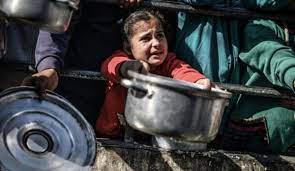
Repeated warnings from humanitarians over desperate food insecurity and imminent famine in Gaza came into focus on Friday amid reports from the enclave’s authorities that a tenth child had died from malnutrition and dehydration.
“The official records yesterday or this morning said there was a tenth child officially registered in a hospital as having starved to death,” said UN health agency spokesperson Christian Lindmeier. “A very sad threshold…(but) the unofficial numbers can unfortunately be expected to be higher.”
The development followed media reports overnight that four children had died in northern Gaza’s Kamal Adwan Hospital, in addition to six other youngsters who died on Wednesday at the same facility and at Al-Shifa Hospital in Gaza City.
Hunger ‘catastrophe’
The deepening food insecurity crisis in the enclave – which UN aid coordination office OCHA said had left one in four facing catastrophic levels of food insecurity – prompted renewed international alarm on Thursday, when more than 100 Palestinians were apparently killed and hundreds were injured trying to get aid from a relief convoy stopped at a roundabout southwest of Gaza City.
Swift condemnation of the incident by UN Secretary-General António Guterres – who also called for an independent investigation – was echoed by other top UN officials, including UN relief chief Martin Griffiths, amid reports of continuing intense Israeli bombardment from air, land and sea across much of the Gaza Strip.
“We saw pictures from Al-Shifa (hospital) where victims of the killings were lying next to each other waiting for any treatment,” the UN World Health Organization (WHO)’s Mr. Lindmeier told journalists in Geneva.
Water and power cut
“The system in Gaza – we’ve said it many times that it’s on its knees – it’s more than on its knees,” the WHO official continued, explaining that all of Gaza’s “lifelines have more or less been cut”, notably water and electricity, since immediately after Hamas-led terror attacks on Israeli communities on 7 October.
OCHA spokesperson Jens Laerke meanwhile insisted that before the conflict “people had food; people were able to produce their own food.”
Today, finding food within Gaza itself, whether from farming or fishing, “is almost impossible”, Mr. Laerke continued. “Putting food on the table…has completely stopped. The very foundation for people's daily sustenance is being ripped away.”
Latest humanitarian food insecurity assessments – the IPC classification index which is used as a reference by aid agencies – indicate that the entire population of Gaza – 2.2 million people – face "crisis" levels of food insecurity, the OCHA spokesperson said. Of that number, around 1.17 million face "emergency" levels of food insecurity, and the plight for another 500,000 is "catastrophic".
'Dire situation'
"We have a dire situation coming towards us at very high speed," Mr. Laerke said, his comments echoing a recent UN humanitarians' warning to the Security Council that famine in the enclave is "almost inevitable" unless aid is massively scaled up.
According to UNRWA, the UN agency for Palestinian refugees, the quantity of aid supplies reaching Gaza in February was just half of January’s total, “and we know that January was not enough at all”, the WHO spokesperson said.
Just last week, the Council heard briefings from top humanitarian organisations, including medical charity Médecins Sans Frontières, which reported that a pattern of attacks by Israeli forces against hospitals and other civilian buildings, together with humanitarian personnel and convoys, was “either intentional or indicative of reckless incompetence”.
Thursday evening, the Security Council held closed consultations, but were deadlocked over a presidential statement related to the aid emergency, according to media reports.
Vital signs
Reiterating repeated UN calls for a ceasefire, Mr. Lindmeier maintained that Thursday’s tragic aid convoy deaths had highlighted how desperate Gazans were for food, fresh water and other essentials after nearly five months of war.
“This is the real drama; this is the real catastrophe here, that food and supplies are so scarce that we see these situations coming up, and the food supplies have been cut off deliberately,” he maintained, noting that Gazans were no longer able to provide for themselves.
“The fields which were existing – the greenhouses, the little bit of agriculture – all that needs water supply, or water supply depending on electricity and pumping stations,” he explained. “This is the real drama; this just underlines more and more that we need an urgent ceasefire now. If not now, then when?”
Source: UN News
https://news.un.org/en/story/2024/03/1147112
 FR
FR EN
EN AR
AR








